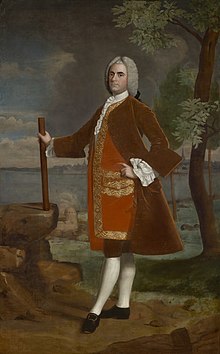| Samuel Waldo | |
|---|---|
 Brigadier General Samuel Waldo (c. 1748–1750) by Robert Feke Brigadier General Samuel Waldo (c. 1748–1750) by Robert Feke | |
| Born | (1696-08-07)August 7, 1696 Boston, Massachusetts, British America |
| Died | May 23, 1759(1759-05-23) (aged 62) near Bangor, Maine, British America |
| Resting place | Fort Point, Cape Jellison, Maine (until 1760) King's Chapel Burying Ground, Boston (since) |
| Spouse |
Lucy Wainwright (m. 1722) |
| Relatives | Lucy Flucker Knox (granddaughter) |
| Military career | |
| Allegiance | |
| Service | |
| Years of service | c.1742–1759 |
| Rank | Brigadier-General |
| Battles / wars | Siege of Louisbourg (1745) |
| Other work | named Mount Waldo |
| Signature | |
 | |
Samuel Waldo (August 7, 1696 – May 23, 1759) was an American merchant, land speculator, army officer and politician in the Province of Massachusetts Bay.
Biography
He was born in Boston, the son of Jonathan Waldo and Hannah Mason. In 1722, he married Lucy Wainwright. In 1730, he purchased a 17th-century title to a large tract of land in Nova Scotia with the intent of establishing a colony there; the title did not stand up when he proposed this plan to the authorities in England. A one-time business partner of Colonel Thomas Westbrook, Waldo acquired a large tract of land between the Penobscot and Muscongus Rivers in what is now Maine where he settled Irish and German immigrants and purchased several slaves.
During King George's War, he served as brigadier-general in the reduction on Louisbourg Fortress in 1745 and served on the temporary council that administered the settlement until Peter Warren was named governor. In 1757, during the French and Indian War, he submitted a plan to William Pitt which served as a basis for the second capture of Louisbourg from the French the following year. Waldo died of apoplexy near present-day Bangor, Maine in 1759 while participating in a military expedition with Governor Thomas Pownall. He was initially buried at Fort Pownall (at Cape Jellison), but his remains were transported to Boston in 1760 and interred at the King's Chapel Burying Ground.
The Maine towns of Waldo and Waldoboro, together with Waldo County, are named for their early proprietor.
His son-in-law Thomas Flucker was royal secretary of Massachusetts and later Provincial Governor. His granddaughter, Lucy Flucker Knox, married Revolutionary War hero and founding father Henry Knox. The Knox family built the impressive Montpelier on Waldo's tract of land in Thomaston, Maine.
-
 Samuel Waldo son-in-law Isaac Winslow by Robert Feke
Samuel Waldo son-in-law Isaac Winslow by Robert Feke
-
 Mrs. Lucy Winslow by Robert Feke
Mrs. Lucy Winslow by Robert Feke
-
 Portrait of Lucy Knox's daughter, Lucy Flucker Knox Thatcher by Albert Gallatin Hoit
Portrait of Lucy Knox's daughter, Lucy Flucker Knox Thatcher by Albert Gallatin Hoit
See also
References
- ^ Lincoln, Waldo (1902). Genealogy of the Waldo family : a record of the descendants of Cornelius Waldo, of Ipswich, Mass., from 1647 to 1900. Worcester, Mass.: Press of Charles Hamilton. pp. 96–105.
- Charles H. Browning, The American Historical Register; The Historical Register Publishing Company, Philadelphia, Pennsylvania 1895
- Rawlyk, George A. (1974). "Waldo, Samuel". In Halpenny, Francess G (ed.). Dictionary of Canadian Biography Online. Vol. III (1741–1770) (online ed.). University of Toronto Press.
- Collections of the Maine Historical Society
- Chadbourne, Ava H. (April 20, 1949). "Many Maine towns bear names of military men". Lewiston Evening Journal. pp. A-2. Retrieved October 17, 2015.
- Portrait number 8
Further reading
- The Lithgow Family-Descendants of John Bridge, 1884, by William Frederick Bridge
- 1696 births
- 1759 deaths
- People of King George's War
- American slave owners
- British America army officers
- American militia generals
- People of Massachusetts in the French and Indian War
- Military personnel from colonial Massachusetts
- Merchants from colonial Massachusetts
- People from colonial Boston
- People from pre-statehood Maine
- Deaths from bleeding